It’s been more than 14 months since Becky Francis was appointed chair of the government’s curriculum review.
As we sit down for a profile interview – in a frosted-panel Department for Education meeting room – it’s still not clear exactly when the final report will land (early November is the best current guess, but it’s largely out of Francis’ control).
The review is bound up in the government’s autumn-term policy blitz alongside a white paper, SEND reforms and new Ofsted inspections.
Government policymaking can be incoherent at the quietest of times – so what’s it like being a fly on the wall now?
‘I’m a bit of a control freak’
“I like leadership, partly because I find it creative, but partly because, like a lot of leaders, I’m a bit of a control freak,” Francis says.
“So being based in the department, and with all of the other things that are going on, I find that quite difficult.
“The way that events and ideas can intervene with things, or different ebbs and flows of capacity in the department, or given other agendas: all of this has been, sort of, interesting.
“Obviously we are independent, and that independence is precious and real, but we also have to work collaboratively with government if we want our findings to land.”
Francis can’t talk about what’s in the final report. But I want to know what she has learnt from taking on such a mammoth role. First, why did she take it on?
“I felt very privileged to be invited to do this job. It feels a really significant responsibility. It’s an opportunity for the sector, and it’s an opportunity to do good things and make improvements.”
Francis attributes this outlook on life – to make a positive difference – to her parents, who were Quakers. “You’re not just in the world, you’re acting on it as well,” she says of their values. “However naïve, I have a view that we ought to be trying to give service and make change for the better.”
But she was also motivated by “the significant damage that could be done” if the “wrong person was appointed”.
“Things have, over time, improved in our system. It’s really important to capitalize on that and, given the capacity issues in the system, not to mend things that don’t need fixing. Instead, [we need] to go harder on where the problems are.”
The view relates back to her schooling. Francis remembers her secondary, Ralph Allen School which was just outside Bath and had a free bus service for pupils in the surrounding villages, as “not a safe place. I saw terrible bullying, including of people that I cared about. It had falling rolls and a sense of crisis”.
She says the school’s general “patchiness” of provision has “characterised the English education system for most of my career”.
But, overall, “the patchiness is improving,” she adds. “Things are better than they were.”
‘Chances are you aren’t going to please a hell of a lot of people ’
Francis believes a fundamental plank of that improvement is the national curriculum, which she points out was introduced the year after she finished O-levels.
“It’s been transformational. It ensured the basics for everybody. Before it we had huge disparities, for example according to gender, with girls not pursuing maths or science.”
Educational inequality has been a “shaping motivation” for Francis ever since. “One of the main takeaways from my experience of schooling was while I managed to go to tech college and then university: many of my friends didn’t.
“In my view, that came down to cultural capital and family background, rather than intelligence or ability.”
Curriculum dreams
Her mission matches with Labour’s – which is to break down barriers to education.
But where to start with the curriculum – easily one of education’s most contested areas.
The curriculum review alone got more than 7,000 responses from its call for evidence, more than Ofsted’s report card plans consultation.
Francis points to the review’s specific terms of reference, which made clear any changes would be “evolution, not revolution”.
“They have proven really important guardrails for the work. I think we did good expectation management, [for instance] around being aware of trade-offs. We don’t want to be triggering unintended consequences.
“Being evidence led, we also really have tried to be guided by the data – that’s super important because it’s a world of myths, assumptions, long-standing campaign positions, etc. I think, genuinely, people are expecting incremental improvement, rather than us throwing everything up in the air.”
But how does she cope with expectations from people who want all those things, and more?
“I feel a real responsibility to get it right,” Francis adds. But “weighed on top of that is the knowledge that, not only are you never going to please all the people all the time – but in a wide spectrum – chances are there’s going to be a hell of a lot of people that you aren’t going to please on one side or another.
“I’m relatively resilient, and not somebody that kind of takes problems to bed generally. But if you ask me, ‘do I dream the curriculum every night?’ Yes, I do.”
‘Worst part of media’
Her appointment was mostly welcomed in the education sector, but less so in some arenas.
One right-leaning newspaper called Francis a “feminist ex-punk”. Another piece quoted a Conservative party source saying she “seems more concerned about gender equality than exam results”.
Francis wrote a book on gender dynamics in the classroom during her first job, studying nurse education at the University of Greenwich. She says social justice, alongside research, are her key passions. And she’s put both into practice ever since.
In 2016, Francis became the first woman director of University College London’s prestigious Institute for Education in its 114-year-history. She said it was a “privilege” to be “part of an absolute research and teaching powerhouse”.
Then in 2020, shortly before Covid hit, she was headhunted to become chief executive of the Education Endowment Foundation, an organisation funded by the Conservative government to become the sector’s trusted broker of evidence on what works.
Her mandate was to “focus on impact and support for the system” – ensuring the body didn’t just do research, but help schools implement its findings, too.
During her time (she’s currently on secondment to the DfE for her curriculum role), the organisation has more than doubled in size.
Francis points to her EEF work when talking about some of the “infuriating” media coverage.
She adds some pieces were a “deliberate attempt to spin …a real worked effort to undermine the government’s choice for political reasons rather than looking at my record and role at the time – leading the government-funded evidence resource for the system, set up by Michael Gove, no less.”
Under Francis, the EEF also ran the first year of the Tory government’s flagship National Tutoring Programme (NTP). The scheme was heavily criticised across the chaotic Covid years, but it delivered more than six million tutoring courses.
Does she regret the EEF’s brief foray from arbiter of interventions to deliverer?
“It was a very political and very angry time between people on the ground in the schools, their representatives, and the government, and everybody in crisis.
“I feel that the National Tutoring Programme got caught up a little bit in that, because in terms of effective delivery of a programme at speed, it is one of the fastest in history. So I certainly have no regrets”.
She also says it opened government eyes to its ability to deliver interventions at scale, and still have impact.
Francis points to the more recent example of the Nuffield Early Language Intervention (NELI) scheme, a government-funded catch-up programme available to schools with reception pupils who need extra support with their speech and language. (She adds NELI is the closest an intervention has got to being an ‘education silver bullet’.)
And perhaps that tutoring criticism also helped with the increased scrutiny of her current role.
Francis jokes about a more recent comment in the media (this time the left-leaning newspaper The Observer) that she was a “timid technocrat”.
“It’s not great to have names and labels attributed to you, but they’ve balanced out. On the one hand I’m a left-wing firebrand – but now I’m a timid technocrat. Hopefully I’ll be somewhere in the middle.”
Financial education surprise
Francis’s interim review did signal some potentially big changes, though. The EBacc accountability measure is under review, the number of GCSE exams could be cut and there is also lots of work going into lightening the primary curriculum load.
Schools Week also revealed last month that the government plans to introduce a year 8 reading test.
Another change could be a strengthening of financial education. Francis says “every focus group or stakeholder meeting that I’ve had with young people – they have volunteered without prompting that they want more financial education”.
She said it has been the most surprising finding from her work. “I would never have predicted that at the beginning. I might have been a bit sceptical about the value or importance.
“But the level of appetite for more financial literacy and education from young people themselves and their parents, let alone the many kinds of stakeholder advocates, has been a real takeaway.”
Her nationwide curriculum roadshow tour – hearing from and speaking to thousands of school staff and pupils – is the element she’s enjoyed most.
“I just really enjoy talking to people about education. It is absolutely fascinating. One of the characteristics for me of the review – and the nature of the review – is the endless dilemmas and trade-offs.
“There’s the amazing upside in the inspiring work and opportunities for improvement. The frustrating side is that there absolutely is no perfect, one solution.”
Francis knows she can’t please everyone. But if her review can bring a bit more coherence – and a little less patchiness – she might just be able to have her old dreams back, too.












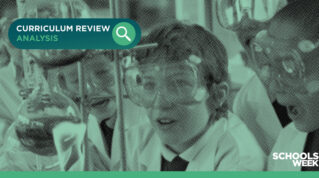
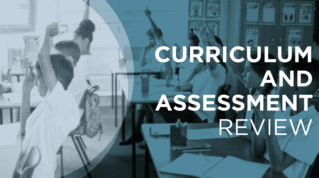

Your thoughts